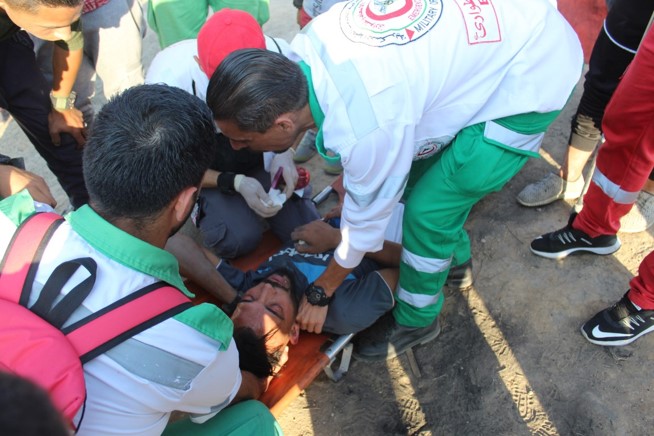
Ref: 75/2019
On Friday, 14 June 2019, in excessive use of force against peaceful protesters on the 61st Friday of the Great March of Return and Breaking the Siege, Israeli forces wounded 92 Palestinian civilians, 28 of them were children and four were paramedics, including a female paramedic, in the eastern Gaza Strip. One of the wounded was a child, who was hit with a live bullet to the chest and sustained serious wound.
According to observations by PCHR’s fieldworkers, the Israeli forces who stationed in prone positions and in military jeeps along the fence with Israel continued to use excessive force against the protesters by firing bullets and tear gas canisters at them. As a result, dozens of the protesters were hit with bullets and teargas canisters without posing any imminent threat or danger to the life of soldiers.
During this week, Israeli forces have escalated their attacks against the medical personnel in the field, wounding 4 members of them with rubber bullets and direct tear gas canisters in eastern Rafah. This indicates that there is an Israeli systematic policy to target the medical personnel and obstruct their humanitarian work that is guaranteed under the rules of the international humanitarian law.
On Friday, 14 June 2019, the incidents were as follows:
At approximately 16:30, thousands of civilians, including women, children and entire families, started swarming to the five encampments established by the Supreme National Authority of Great March of Return and Breaking the Siege adjacent to the border fence with Israel in eastern Gaza Strip cities.
Hundreds of protesters, including children and women, gathered adjacent to the border fence with Israel in front of each encampment and its vicinity tens and hundreds of meters away from the fence. The protesters chanted slogans, raised flags, and in very limited incidents attempted to approach the border fence and throw stones at the Israeli forces.
Although the protesters gathered in areas open to the Israeli snipers stationed on the top of the sand berms and military watchtowers and inside and behind the military jeeps, the Israeli forces fired live and rubber bullets in addition to a barrage of tear gas canisters. The Israeli attacks, which continued at around 19:30, resulted in the injury of 92 Palestinian civilians, 28 of them were children and four were paramedics, including a female paramedic. sAmong those wounded, 25 were hit with live bullets and shrapnel, 52 were hit with rubber bullets and 15 were directly hit with tear gas canisters. One of the wounded was a child, who was hit with a live bullet to the chest and sustained serious wound.
In addition, dozens of civilians suffered tear gas inhalation and seizures due to tear gas canisters that were fired by the Israeli forces from the military jeeps and riffles in the eastern Gaza Strip.
 The following table shows the number of civilian casualties due to the Israeli forces’ suppression of the Great March of Return since its beginning on 30 March:
The following table shows the number of civilian casualties due to the Israeli forces’ suppression of the Great March of Return since its beginning on 30 March:
| Killed | Wounded | |
| Total | 207 | 12707 |
| Children | 44 | 2532 |
| Women | 2 | 385 |
| Journalists | 2 | 203 |
| Medical personnel | 4 | 209 |
| Persons with disabilities | 9 | Undefined |
| Note:Among those wounded, 548 are in serious condition and 137 had their lower or upper limbs amputated; 123 lower-limb amputations, 14 upper-limb amputations, and 25 children had their limbs amputated according to the Ministry of Health. The number of those wounded only include those wounded with live bullets and directly hit with tear gas canisters, as there have been thousand others who suffered tear gas inhalation and sustained bruises. | ||
PCHR reiterates Palestinians’ right to peaceful assembly to confront Israel and its forces’ denial of the legitimate and inalienable rights of the Palestinian people, including the right to self-determination, right to return and right to end the occupation of the Palestinian territory.
PCHR stresses that the Israeli forces should stop using excessive force and respond to the legitimate demands of the demonstrators, particularly lifting the closure which is the real solution to end the humanitarian crisis in the Gaza Strip.
PCHR reiterates the reported published in February by the UN Commission of Inquiry which emphasizes what came by PCHR and other Palestinian and international human rights organizations. The report at the time concluded that the Israeli violations may amount to war crimes and crimes against humanity.
PCHR emphasizes that continuously targeting civilians, who exercise their right to peaceful assembly or while carrying out their humanitarian duty, is a serious violation of the rules of international law, international humanitarian law, the ICC Rome Statute and Fourth Geneva Convention.
Thus, PCHR reiterates its call upon the ICC Prosecutor to open an official investigation in these crimes and to prosecute and hold accountable all those applying or involved in issuing orders within the Israeli Forces at the security and political echelons.
PCHR also emphasizes that the High Contracting Parties to the 1949 Fourth Geneva Convention should fulfill their obligation under Article 1; i.e., to respect and ensure respect for the Convention in all circumstances and their obligations under Article 146 to prosecute persons alleged to commit grave breaches of the Fourth Geneva Convention.
PCHR calls upon Switzerland, in its capacity as the Depository State for the Convention, to demand the High Contracting Parties to convene a meeting and ensure Israel’s respect for this Convention, noting that these grave breaches constitute war crimes under Article 147 of the same Convention and Protocol (I) Additional to the Geneva Conventions regarding the guarantee of Palestinian civilians’ right to protection in the occupied territories.